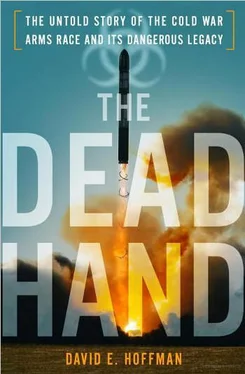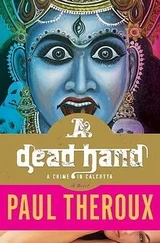Gorbachev immediately saw what was missing. The new formula omitted any mention of the word laboratory . Was it done on purpose? Yes, Reagan said.
Reagan also proposed two five-year periods for weapons elimination—exactly the same time frame as Gorbachev had suggested in January. But in Reagan’s version, there would be a 50 percent cut in “strategic offensive arms” in the first five years and the remaining 50 percent of “offensive ballistic missiles” in the second. Gorbachev said, correctly, the two five-year periods each eliminated a different category of weapon—how could that make sense? The first phase was all strategic arms, the second phase was only missiles. These were obviously different categories. “There is some kind of confusion here.” Indeed there was. The U.S. draft had been inexact in an effort to satisfy both sides.
Reagan was also confused. “What I want to know is, will all offensive ballistic missiles be eliminated?” he asked.
Gorbachev suggested that in the second phase, the wording should say “strategic offensive weapons, including ballistic missiles.” Perhaps they could improve the language later on, he said.
Then Reagan suddenly took everything further than it had ever gone before. An incredible moment in the history of the Cold War arrived abruptly, without any warning, without preparation, without briefing papers or interagency process, without press conferences or speeches, in the small room overlooking the bay.
“Let me ask this,” Reagan inquired. “Do we have in mind—and I think it would be very good—that by the end of the two five-year periods all nuclear explosive devices would be eliminated, including bombs, battlefield systems, cruise missiles, submarine weapons, intermediate-range systems, and so on?”
Gorbachev: “We could say that, list all those weapons.”
Shultz: “Then let’s do it.”
Reagan’s proposal was, by any measure, the most concrete, far-reaching disarmament initiative by a U.S. president ever to be formally submitted in a superpower summit negotiation. It was not a throwaway line. If earlier he had talked about eliminating ballistic missiles, or been imprecise or cloudy about what was under discussion, at this moment he swept away any doubts and clearly proposed total nuclear disarmament. There was no confusion. Reagan had reached the very core of his beliefs at the very peak of his power.
But Reagan and Gorbachev did not take out a paper and sign it at that moment. It was a huge missed opportunity.
Gorbachev, while saying there was a chance for such an agreement, again insisted that research on missile defense must be confined to the laboratory. “The question of laboratories is of fundamental importance.”
Reagan refused, saying his aim was “to make a kind of gas mask against nuclear missiles” and a system to protect against “the danger of nuclear maniacs.”
Gorbachev: “Yes, I’ve heard all about gas masks and maniacs, probably ten times already. But it still does not convince me.” He added, again, that he only wanted to keep missile defense research in the laboratory.
Reagan: “You’re destroying all my bridges to continuation of my SDI program.”
Gorbachev: “In regard to laboratories, is that your final position? If so, we can end our meeting at this point.”
Reagan: “Yes it is.”
More verbal jousting followed, with no progress. Gorbachev appealed to Reagan’s sense of history. If they could sign an agreement containing all the Soviet concessions, “you will become, without exaggeration, a great president. You are now literally two steps from that.” If they could sign, Gorbachev pleaded with Reagan, “it will mean our meeting has been a success.” And if not, “then let’s part at this point and forget about Reykjavik. But there won’t be another opportunity like this. At any rate, I know I won’t have one.”
Both men seem to have sensed their historic moment was slipping through their fingers.
“Are you really going to turn down a historic opportunity for the sake of one word in the text?” Reagan demanded. The word was “laboratory.”
“You say that it’s just a matter of one word,” Gorbachev shot back. “But it’s not a matter of one word, it’s a matter of principle.” If he went back to Moscow having allowed Reagan to deploy his missile defense, Gorbachev added, “they will call me a fool and irresponsible leader.”
“Now it’s a matter of one word,” Reagan lamented. “I want to ask you once more to change your viewpoint, to do it as a favor to me so that we can go to the people as peacemakers.”
“We cannot go along with what you propose,” Gorbachev responded. “If you will agree to banning tests in space, we will sign the document in two minutes. We cannot go along with something else… I have done everything I could.” Shultz recalled that Gorbachev said, “It’s ‘laboratory,’ or good-bye.”
Reagan passed a note to Shultz: “Am I wrong?” Shultz whispered back, “No, you are right.”
Reagan stood up to go and gathered up his papers, as did Gorbachev, according to Shultz. “It was dark when the doors of Hofdi House opened and we all emerged, almost blinded by the klieg lights. The looks on our faces spoke volumes,” Shultz recalled. “Sad, disappointed faces,” said Chernyaev.
“I still feel we can find a deal,” Reagan said to Gorbachev as they parted.
“I don’t think you want a deal,” Gorbachev replied. “I don’t know what more I could have done.”
“You could have said ‘yes,’” Reagan said.
“We won’t be seeing each other again,” Gorbachev said, meaning that they would not see each other again in Reykjavik. The remark was overheard and set off a rumor that the talks had failed terribly.
Shultz joined Reagan back in the residence, where the president and his top advisers slumped in easy chairs in the solarium. “Bad news. One lousy word!” Reagan said. 67
That evening, he summed it up briskly in his diary. “He wanted language that would have killed SDI,” Reagan wrote. “The price was high but I wouldn’t sell & that’s how the day ended. All our people thought I’d done exactly right. I’d pledged I wouldn’t give away SDI & I didn’t but that meant no deal on any of the arms reductions. I was mad—he tried to act jovial but I acted mad and it showed. Well the ball is in his court and I’m convinced he’ll come around when he sees how the world is reacting.” 68
“I was very disappointed—and very angry,” Reagan recalled years later in his memoirs.
Gorbachev was also fuming. “My first, overwhelming, intention had been to blow the unyielding American position to smithereens, carrying out the plan we had decided in Moscow: if the Americans rejected the agreement, a compromise in the name of peace, we would denounce the U.S. administration and its dangerous policies as a threat to everyone around the world.” Chernyaev later noted this was the Politburo’s instructions to Gorbachev: to come out blasting Reagan if the Americans refused to give the Soviets what they wanted.
But as Gorbachev walked to a press conference, he was unsure. Had they not accomplished a lot, even if they failed to reach a final agreement?
“My intuition was telling me I should cool off and think it all over thoroughly. I had not yet made up my mind when I suddenly found myself in the enormous press conference room. About a thousand journalists were waiting for us. When I came into the room, the merciless, often cynical and cheeky journalists were waiting for us. I sensed anxiety in the air. I suddenly felt emotional, even shaken. These people standing in front of me seemed to represent mankind waiting for its fate to be decided.”
In another dramatic turn, Gorbachev decided not to follow his instructions from the Politburo. He decided not to smash Reagan to smithereens, and instead he sounded optimistic.
Читать дальше












